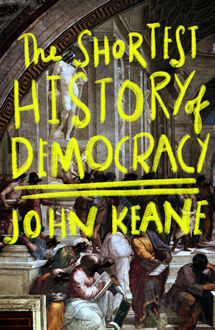Reviewed by Rama Gaind.
By John Keane, Black Inc., $24.99.
 Instigated by tough questions and doubts, The Shortest History of Democracy presents a compact reply: while practically all democracies are facing their deepest crisis since the 1930s, we are by no means in a replay of that dark period.
Instigated by tough questions and doubts, The Shortest History of Democracy presents a compact reply: while practically all democracies are facing their deepest crisis since the 1930s, we are by no means in a replay of that dark period.
Understanding how our times are unique requires us to take the past seriously. Professor of Politics at the University of Sydney, Keane states history obviously matters because when we are ignorant of the past, we invariably misunderstand the present.
Three decades ago, democracy seemed blessed and people power mattered. Public resistance to arbitrary rule changed the world. Military dictatorships collapsed. Apartheid was toppled.
Now things are different. In Belarus, Bolivia, Myanmar, Hong Kong and other places, citizens are the victims of arrest, imprisonment, beating and execution. Elsewhere, democrats generally seem to be on the back foot, gripped by feelings that our times are weirdly unhinged and troubled by worries that big-league democracies are sliding towards a precipice, dragged down by worsening social inequality, citizen disaffection and the rot of unresponsive governing institutions.
“Fears are growing that democracy is being sabotaged by angry popular support for demagogues, or by surveillance capitalism, pestilence, the rise of China, and Putin-style despots who speak the language of democracy but don’t care a fig for its substance.”
Another thing: this slim book sets out to reawaken a sense of wonder about democracy. Added features are democracy’s timeline including Assembly, Electoral and Monitory. In a forceful, informative chronicle, this acclaimed political thinker traces its intricate history. Keane bids farewell to the cliché that democracy was born in Athens and the bigoted belief that the early Islamic world contributed nothing to the spirit and institutions of democracy. One thing this book is not: a gloomy tale of catastrophes.
This is a history that emphasises change and contingency, upheavals and setbacks. As Keane notes in his introduction, “Democracy has no built-in guarantees of survival.”


